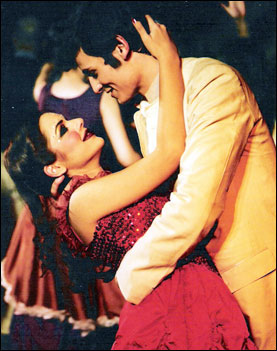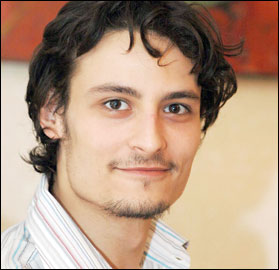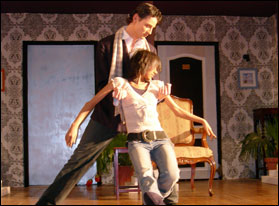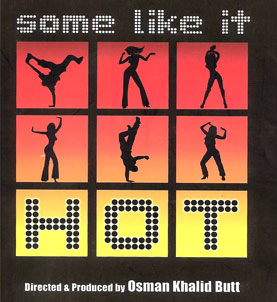|
|
| |
instep profile
Meet the Orlando Bloom of Islamabad
They liken him to the British heart throb. The resemblance
is striking, but there is much more to Osman Khalid Butt than
what meets the eye…
By Maria Tirmizi
|
| |
As
a poetic and love-struck Christian in Moulin Rouge, a brash Irish
journalist in Freedom Bound, a charming candlestick in Beauty and
the Beast, a side-twitchingly hilarious Stanley Gardner in You Only
Marry Twice and an adorably quirky, cross-dressing Jerry in Some Like
it Hot, Osman Khalid Butt, at the vernal age of 21, is the new darling
of theatre in Islamabad.
Son of the renowned thespian Dr Khalid Saeed Butt, Osman's incredible
comic timing and invigorating dance sequences had already made people
sit up and take notice back in April 2005 when he played the lead
in Moulin Rouge, a play directed by Shah Sharabeel. Even in his subsequent
comparatively minor roles, including the duo roles of Edmond Dante's
father and a seedy banker in Count of Monte Cristo in June 2005, directed
by Raja Zia ul Haq, and a candlestick called Lumiere in Beauty and
the Beast in August 2005, directed by Ghazala Siddique, a part for
which he dyed his hair ash blonde and was made to carry heavy fiberglass
candle-stands while performing, his stage presence shone so bright
it could only have been the making of a star. |
 |
| |
When
he played a hopelessly funny lodger caught between a neighbour's bigamous
marital woes in You Only Marry Twice, again directed by Shah Sharabeel
in 2006, his performance alone stole the show. In November 2006, a
play called Freedom Bound, directed by Tülin Khalid and dealing
with more serious undertones of humanity, will power and survival,
his depth and range as an actor was much admired.
But by far, it was his ability to pull off his recent directorial
debut, Some Like it Hot, without corporate sponsorship to a full house
for 14 straight days that not only significantly raised his own profile,
but also made people grasp that there's more to amateur theatre in
Islamabad than Shah Sharabeel. |
| |
Amateur theatre
has been around in Islamabad since Sharabeel's Centre Stage Production,
formed in 1990, took the city by storm in 2004 with his play Phantom
of the Opera. It provided a much needed boost to the cultural activity
of the city of Islamabad, which had long been infamous for being deader
than a graveyard.
"Prior to Sharabeel's entry, there weren't a whole lot of plays
to watch in the city. Theatre was restricted to activism, with socially
relevant plays organized by a few NGO's to raise awareness. But these
weren't for the general public. Sophisticated Urdu plays, also dealing
with socially relevant messages, were brought to town by Lahore's
Ajoka Theatre. Now and then, Goethe-Institut, a German institute in
Karachi brought a good show in Islamabad for a select few to watch
in Marriott," said a senior cultural correspondent. |
 |
| |
In
the last three years, with Sharabeel staging five successful consecutive
plays in Islamabad and Capital Development Authority (CDA) Chairman
Kamran Lashari providing considerable patronage through his Margalla
Festivals, the city's profile in terms of parallel and amateur theatre
has significantly elevated.
"Credit for bringing real entertainment in theatre to the masses
in Islamabad goes to Shah Sharabeel. He gave a platform to young,
local talent, making them perform consistently. He paid attention
to minute technical details exceptionally well. Basically, he brought
a lot of music, fun and dance to Islamabad. Now, plays are being watched
and performed at a whole new level," she continued.
After Phantom of the Opera, Sharabeel directed Moulin Rouge, Dally
in the Dark, You Only Marry Twice and the recent Bombay Dreams, each
ensuring an Islamabad Club auditorium packed to capacity.
"At least now there is something to do in Islamabad," a
26-year-old girl working at an NGO laughed.
Soon, others joined the scene. People like Ghazala Siddique (Beauty
and the Beast) and Tülin Khalid (Freedom Bound) came forward
to nourish the plant Sharabeel had planted. |
| |
Alliance Francaise,
the French cultural center also stepped up their efforts for theatre
in 2004. Their play Paradise Lost, written and performed by their
very own creative writing team, and produced and directed by Fizza
Hassan, was well-received, starting a process of annual plays by the
institute since then.
Nabeela Ahmed, Cultural Coordinator of Alliance Francaise and the
Embassy of France said, "Theatre is now rampant in Islamabad.
Many producers and directors have sprung up, some good ones, some
bad ones. It's a very productive way of channelizing the energies
of young people since there aren't many things to do in Islamabad." |
 |
| |
With
some brilliant, formerly-unknown talent like Osman Butt, Natasha Ejaz,
Ali Rehman and Mariam Saleem, and some plain eager performers pouring
in from schools and colleges, locals started looking at theatre as
a much anticipated annual/biannual event with lots of social intermingling
coupled with pure entertainment. Funny, modern adaptations of plays
and films, incorporated with a lot of hip, current music, stirred
cheerful applause from an audience that was beginning to know what
it likes.
The crowd that started filling in the seats of Islamabad Club auditorium
no longer consisted solely of teenagers looking for a good time, but
families and the older age bracket as well, who showed genuine interested
in theatre. Though some innuendos were deemed slightly inappropriate
for a father and daughter to appreciate together, the overall climate
in the auditorium was civilized and appreciative, with a large cross-section
of the city, from students, to bureaucrats to grandparents, having
'a whole lotta' fun'. |
| |
The seed that
owes its sowing to Sharabeel has now begun to grow with a life of
its own. His recent direction, the tragic-themed Bombay Dreams, failed
to mesmerize the crowd the way his earlier plays had. One could clearly
hear snickers from the audience when the lead characters began dying
one by one and apart from one or two actors who performed remarkably
well, including a transvestite named Sweety (Faheem Azam) and a snotty
actress named Rani (Nida Ali), most of the other characters seemed
wooden and forced.
But one must keep in consideration that though theatre is growing
here, it still has a long way to go. The scene is amateur and the
actors have no formal training. Just to encourage the trend of young
people at least giving theatre a shot by defying some established
norms and standing up on stage, an act that itself takes enormous
courage, a director has no choice but to work with what he's got.
|
 |
| |
Though the audience did not have gushing praises for Bombay Dreams,
the director's name alone, along with A R Rahman's music and dance
sequences by the talented Lahore-based choreographer Atif Khan, still
managed to ensure a packed auditorium.
People in Islamabad are now starting to get choosy about what they
do or do not like. They just don't want to wait for Sharabeel to come
once or twice a year. They want other people to join in. Everyone
is eager for the next play. The process has started and it can't be
suppressed.
Which brings us back to Osman Khalid Butt. First discovered by Sharabeel,
he has preferred to sit behind the captain's wheel rather than be
just one of the better crew members. His charming, quirky comic instinct,
boyish good looks and an innate knack for scriptwriting and directing
transported him rapidly from one of the lead roles of Moulin Rouge
to the grander role of a successful director, producer, scriptwriter
and choreographer within a short span of two years, breathing even
more life into the growing theatre scene in the capital.
Tulin Khalid has said about Osman, "I like to imagine he was
born under the wings of the muse Terpsichore, surrounded by poetry
and music. He transcends the lines, breathing life into all he does,
taking us along on his remarkable journey."
Natasha Ejaz, his assistant choreographer and one of the main characters
in Some Like it Hot, told Instep, "There is a pleasure sure in
being mad that none but mad men know. That is Osman for me."
Also affectionately called the 'Orlando Bloom of Islamabad' by friends,
he describes himself as having a "Simon Cowell-like" sarcastic
sense of humour, an outspoken personality to the observer, but a personal
side he prefers keeping to himself. He traces the origin of his passion
for theatre to genes inherited from his father and his family's 'steady
diet of Bollywood films", amusingly recalling his brother's bedroom
walls splashed with posters of Sri Devi.
The first time he saw a staged production in Islamabad, Dracula, back
in 2004, he remembers being absolutely spellbound. The aspiring actor
in him nudged him hard to audition for the next play, which landed
him the lead role in Moulin Rouge.
After winning the city's affection in four subsequent plays, he staged
his own production and directorial debut, Some Like it Hot, (a 1959
comedy starring Marilyn Monroe) in March 2007. He adapted the play's
script from a candy-fluff comedy of the 50's to a more meaningful,
relevant theme, choreographing for it, and also playing one of the
main characters, a hilarious, trouble-seems-to-find-his-way kind of
fellow named Jerry who dresses up as a woman to escape an underworld
gang, and ends up fending off the outlandish advances of a middle-aged
man. He simultaneously launched his company, The Living Picture Productions,
and quit his job as Creative Head at Grapevine.
The journey from idea of the play to its execution saw numerous hurdles,
from two actors quitting on him during rehearsals to cynics from amongst
those he least expected telling him he was making the worst mistake
of his life. Each morning, he would go looking for sponsorships and
faced rejection after rejection. This was a real blow to him, making
even his own actors doubt whether the play would ever see daylight.
"It illuminated the inside workings of this business. It's so
easy to sponsor established names, but if you don't help out young,
emerging talent, where would people like us go?" he says.
But he also feels that getting no sponsorship turned out to be a blessing
in disguise, giving him immense creative freedom. Yet all is not a
bed of roses when it comes to breaking new ground in the capital.
The conservatism of certain sections is not very receptive to Osman's
vision. Some people even went to the extent of calling him 'cheap
and chauvinistic' for using images of women to lure the crowd to theatre.
"I was taken aback by these comments because they could not have
been further away from reality. Most people made them without even
bothering to watch the play. Some lady objected to the poster of the
play Some Like it Hot saying it degraded women, but the poster, very
creatively done, only showed the silhouette of women, along with that
of men as well. And the very subject of the play, that talent is often
overlooked for outward beauty, had a deep social message in favour
of women and very relevant to our society," says Osman.
But faith and pure talent ultimately knocked down one hurdle after
the next and the success of the play defied all odds. People came
to watch it again and again, applauding whole-heatedly and pouring
praises on Osman and his team, making him relish in the euphoria for
which he had worked so hard.
He is also proud of the fact that according to him, the play considerably
destroyed the "pass culture" in Islamabad, with his strict
"no pass" policy.
"If people are willing to pay 10,000 rupees for a fashion show,
why can't they pay a little amount for being thoroughly entertained
and encouraging the city's young talent? I believe if everyone is
coming with free passes, theatre is being disrespected."
Not one to be satisfied with just one successful venture, he is currently
busy contemplating his next project; which may either be Mughal-e-Azam,
the first movie he ever watched as a child, or The Hunchback of Notre
Dame. He also remains involved with other projects, like his recent
role in Pakistan's first internationally-distributed horror film Zibahkhana,
in which he played a rebel teenager who finds himself in the middle
of a zombie infected forest, and he has also helped write the script
of another short horror amateur film. His company, The Living Picture
Productions, is not solely restricted to commercial plays; its sphere
will soon extend to fashion show choreography, as well as theatre
workshops and drama festivals in schools and colleges.
He also feels passionate about bringing back Urdu theatre as a respectable
medium, regretting the fact that our beautiful language has been resorted
to the level of a secondary language.
With such attempts, along with stepped up efforts for the construction
of a theatre exclusively for performing arts in the capital, and increased
patronage from the corporate sector specifically for emerging talent,
theatre in Islamabad can go much further.
Khadija Qureshi, who also performed in Some Like it Hot said, "Islamabad's
theatre scene is definitely on the rise. First it was all about fun
and comedy, but now people are starting to watch plays with a soul."
"Some of the best plays in Islamabad have come out from people
who have been born and bred here. It's only a matter of time till
the amateur theatre scene out here turns into a professional one,"
said Natasha Ejaz.
Responding to a question on his future goals and aspirations, Osman
jokes that he already has an Oscar-accepting speech prepared since
he was 13. Pulling a serious face on a humbler note, he says that
he hopes to set a strong foothold in the entertainment industry.
We prefer rooting for the former. |
| |
|

